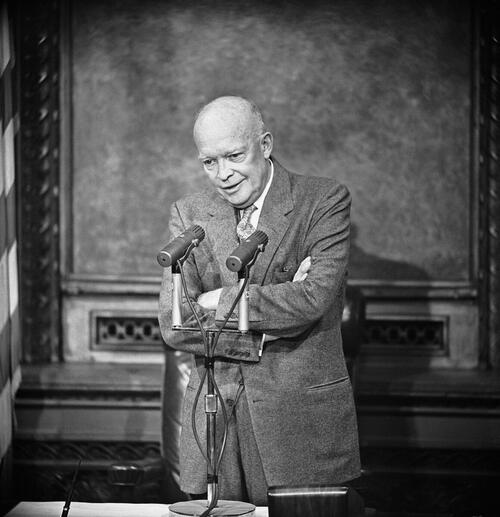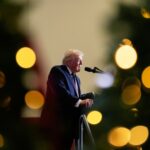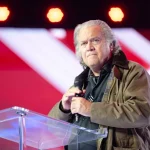
Authored by Mike Scanlon via RealClearDefense.com,
An ability to win hearts and minds has long been seen by America’s leadership as essential to domestic and international politics and security. For much of the Pax Americana, our government and intelligentsia have poured time, effort, and money into studying how to persuade everyone from allies to enemies and, conversely, how to counter an opponent’s influence campaigns.
But something essential has changed since the rise of President Donald Trump as a political force.
During the Cold War, President Dwight Eisenhower spoke up against censorship and for lay readers in the wake of an attempt by Senator Joseph McCarthy’s henchmen to eradicate communist books from libraries:
Don’t join the book burners. Don’t think you are going to conceal faults by concealing evidence that they ever existed. Don’t be afraid to go in your library and read every book . . . .
How will we defeat communism unless we know what it is, and what it teaches, and why does it have such an appeal for men, why are so many people swearing allegiance to it? . . .
And we have got to fight it with something better, not try to conceal the thinking of our own people. They are part of America. And even if they think ideas that are contrary to ours, their right to say them, their right to record them, and their right to have them at places where they are accessible to others is unquestioned, or it isn’t America.
These days, America’s most educated have grown distrustful of non-experts and their ability to process dangerous ideas.
Our elites have launched a campaign to protect the undereducated from themselves.
-
The credentialed class pressures book retailers to stop selling “uncritical” translations of sinister foreign texts, meaning those lacking an accepted authority’s “soberly critical framing, complete with detailed footnotes, contextual commentary, or other forms of annotation.”
-
Journalists writing about controversial topics do not link directly to primary sources but instead filter such news “through multiple layers of condemnation by a shrinking pool of academics trusted to read raw material.”
-
Our best and brightest unabashedly seek to silence individuals who disagree with their betters and to regulate (or outright suppress) social media sites that allow free (or free-ish) debate about unsafe thoughts.
-
Opinion makers cheer on activists seeking to deplatform or shout down an ever-growing list of enemies, including those who refused to toe the party line on Russia’s war in the Ukraine.
-
Self-proclaimed defenders of press freedom are rallying to safeguard the right of social media companies to collaborate with state actors to squelch wrongheaded arguments and to wall the incorrigible off from the marketplace of ideas.
-
The Biden Administration tried to establish a governance board to combat disinformation.
That crusade is not going well.
As Martin Gurri has pointed out time and time again, America’s thought leaders and information curators are on the ropes. Academics, think tankers, pundits, and policymakers no longer can hide the fact that they often either have no clue what they are doing or are all too willing to oversell their case—and will purposefully obfuscate or outright lie from time to time to get their way.
Yet most experts are more than happy to pretend as if nothing were wrong as they claw their way up the professional ladder. Some insist on singing paeans to themselves while demanding ever-greater protection from open competition and even outside criticism.
Take, for instance, the authorities advocating a muscular foreign policy or demanding robust countermeasures against domestic extremism. The Global War on Terror was not America’s finest hour. We lost Afghanistan. It would be difficult to claim victory in Iraq. The great hopes of the Arab Spring came to naught.
But repeated failures did not cause self-doubt to creep into the minds of credentialed militarists of any stripe. Most continued to insist that the next war would go our way. Some have even been trying to expand their territory, such as the counterinsurgency specialists who tout their experience in (wildly unsuccessful) campaigns against international extremism and propaganda when marketing themselves as would-be, should-be leaders of the war against domestic extremism and disinformation.
There was never any reason to assume that the pro-war clique would fare any better if provided yet another opportunity. And failures have piled on missed opportunities in the Ukraine to the point where security specialists are, once again, scrambling to protect the foreign policy establishment by blaming its most recent fiasco on a lack of American commitment to winning what may always have been an unwinnable war.
The crisis afflicting much of America’s expert class is less that the internet has made it easier for the public to push back, and more that the elite’s preferred models just don’t work. For instance, many disinformation experts justify censorship with a model positing that malevolent information drives malevolent acts. Similarly, some domestic terrorism experts justify increased surveillance with a model positing that terrorists broadcast their “terrorist intent” before engaging in acts of terrorism.
But, even if most people who commit violent acts were exposed to disinformation or made some announcement of terrorist intent, notably lacking is substantial evidence that a significant percentage of the people exposed to disinformation or of the individuals articulating terrorist intent go on to commit violent acts. In other words, many of our leading domestic security experts seem unwilling or unable to differentiate between a hypothesis and a theory. This is suboptimal.
Worse, the smarter-than-thou crowd continues to push for surveillance and censorship despite the glaring problems with their firmly held beliefs about causality and causation. The proposition that bad ideas lead to bad acts has been “disproven over and over again.” And even many of the authorities seeking to elevate their profiles by fearmongering about “stochastic terrorism” must admit that the hateful speech in the establishment’s targets is unregulatable under American law. Unlike “a call to lynch someone when a mob has gathered nearby,” the “use of mass media to provoke random acts of ideologically motivated violence that are statistically predictable but individually unpredictable” just isn’t “advocacy . . . directed to inciting or producing imminent lawless action and . . . likely to incite or produce such action.” It can’t meet the standard required for the government to forbid or punish inflammatory speech.
To the extent that America still cares about freedom of speech or other civil liberties, the surveil-and-censor hacks should be laughed off the stage. Yet the grandees of the so-called “Censorship-Industrial Complex” are overplaying an incredibly weak hand based on what appears to be little more than blind faith that the public isn’t qualified to question the elite. This is silly; the emperor has no clothes.
The collected academic expertise of the anti-disinformation movement proved itself worthless in the real world because disinformation specialists were incapable of preventing the Biden Administration’s Disinformation Governance Board from falling victim to—of all things—a disinformation campaign. Given the anti-disinformation crowd’s admitted inability to effectively contest disinformation with speech and counter-speech in open competition, the public has every right to question whether the Biden Administration’s “Ministry of Truth” was meant to institute a de facto censorship regime where progressive- or establishment-led media and social media companies would collude with like-minded state actors to suppress populist voices.
The disinformation that touched off the anti-disinformation crusade—propaganda propounded by the Russian government during the 2016 and 2020 presidential elections—either appears far too ham-handed to be persuasive or seems all but indistinguishable from arguments and assertions made by America’s most highly esteemed progressive identitarians. Given the anti-disinformation cult’s penchant for announcing causation rather than proving it, the public has every right to question whether disinformation specialists operate in a fantasy world of just-so stories where fancy academic degrees and enviable job titles can magically transform an “and” (the Russian government tried to interfere with the 2016 presidential election, and Donald Trump won) into a “so” (the Russian government tried to interfere with the 2016 presidential election, so Donald Trump won).
The social media-based disinformation campaigns initiated by America’s enemies during the ongoing Trump era seem to be as ineffective as the failed social media-based information campaigns launched by America during the Global War on Terror. Given how disproportionate the elite’s highly publicized panic over disinformation is to the actual threat from disinformation, the public has every right to question whether our leadership is conjuring up sham crises to exert tighter control over a nation that has grown largely unimpressed by even the shiniest of shiny credentials.
Although the stage has been set for a complete collapse of expert rule, it will be difficult for the current crop of experts to save themselves from—of all things—themselves. The traditional authority system is almost uniquely unfit to deal with the very public failure of conventional models.
The incentive structure of America’s credential-granting institutions is out of whack. Expert careers are advanced by appealing to recognized authorities and representatives of wealthy benefactors or powerful state actors in a more-or-less closed system, which the establishment zealously protects from outside interference.
-
Freedom from open competition allows diplomas and job titles to trump the substance of arguments and the abilities of individuals in the cloistered world of experts. Authorities can take the ostrich defense or declare victory when faced with a threat to their position, so experts often decry dissent while studiously avoiding anything resembling critical engagement with critiques of their work advanced by deplorables or members of the great unwashed.
-
The need to appeal to recognized authorities stifles innovation. Up-and-comers are best advised to avoid heterodox approaches, which are liable to offend a patron, and to adopt whatever orthodox approach happens to be favored by their most powerful backer, regardless of the merit of that approach. Established experts can use the failed experiment that is peer review to prop up their favorite disproved theory, to advance a fashionable narrative, or to snuff out groundbreaking work capable of challenging the orthodoxies upon which their reputations rest.
-
The authority system even incents experts to exaggerate. To draw attention in crowded fields or obtain grant money from activist sources, specialists commonly conflate advocacy with analysis, make overly dire predictions, then demand radical measures to avert the impending crises. And very rarely are experts punished for getting things wrong. It is therefore reasonable for specialists to stake out the most aggressive position possible, rather than the most accurate or defensible one.
The expert system has broken down and requires structural reform. For example, it is as if academia—the crown jewel of the authority system—were designed to be as unfair and inefficient as possible.
-
Despite our knowledge that the “Next Big Thing” tends to be hit upon by someone who is young or new to a discipline and often languishes until the then-dominant cohort of scholars loses control over the field, the tenure system concentrates power and authority in exactly the wrong hands—those of established professors.
-
The deference afforded to tenured faculty within the American academy not only makes our colleges and universities incredibly hostile environments for truly innovative ideas, but also creates ideal conditions for alpha-sycophants valiant enough to kowtow their way to the top.
-
Protecting academic authorities from the consequences of their actions over-incents “brave stands” (by rendering them bravery-free) and allows indefensible arguments to overrun the academy and occasionally leak into the wider world—often to the detriment of the very non-elites whom the scholarly elite purports to represent.
In short, despite all the exhortations by the Spencerians in the mainstream media and other establishment outlets about the need for academics to remain a self-regulating profession, the greatest threats to the advance of learning and to academic freedom come from within the academy and are, at minimum, exacerbated by a system that permits faculty self-governance.
It’s high time for a round of creative destruction. The non-experts who oversee or fund America’s colleges and universities should consider doing away with tenure and exposing academics to the crucible of competition. After all, pretty much everyone outside the Ivory Tower realizes that the fairest and most efficient way to deal with the replication crisis in the social sciences is an employment crisis among social scientists.
Authored by Mike Scanlon via RealClearDefense.com,
An ability to win hearts and minds has long been seen by America’s leadership as essential to domestic and international politics and security. For much of the Pax Americana, our government and intelligentsia have poured time, effort, and money into studying how to persuade everyone from allies to enemies and, conversely, how to counter an opponent’s influence campaigns.
But something essential has changed since the rise of President Donald Trump as a political force.
During the Cold War, President Dwight Eisenhower spoke up against censorship and for lay readers in the wake of an attempt by Senator Joseph McCarthy’s henchmen to eradicate communist books from libraries:
Don’t join the book burners. Don’t think you are going to conceal faults by concealing evidence that they ever existed. Don’t be afraid to go in your library and read every book . . . .
How will we defeat communism unless we know what it is, and what it teaches, and why does it have such an appeal for men, why are so many people swearing allegiance to it? . . .
And we have got to fight it with something better, not try to conceal the thinking of our own people. They are part of America. And even if they think ideas that are contrary to ours, their right to say them, their right to record them, and their right to have them at places where they are accessible to others is unquestioned, or it isn’t America.
These days, America’s most educated have grown distrustful of non-experts and their ability to process dangerous ideas.
Our elites have launched a campaign to protect the undereducated from themselves.
That crusade is not going well.
As Martin Gurri has pointed out time and time again, America’s thought leaders and information curators are on the ropes. Academics, think tankers, pundits, and policymakers no longer can hide the fact that they often either have no clue what they are doing or are all too willing to oversell their case—and will purposefully obfuscate or outright lie from time to time to get their way.
Yet most experts are more than happy to pretend as if nothing were wrong as they claw their way up the professional ladder. Some insist on singing paeans to themselves while demanding ever-greater protection from open competition and even outside criticism.
Take, for instance, the authorities advocating a muscular foreign policy or demanding robust countermeasures against domestic extremism. The Global War on Terror was not America’s finest hour. We lost Afghanistan. It would be difficult to claim victory in Iraq. The great hopes of the Arab Spring came to naught.
But repeated failures did not cause self-doubt to creep into the minds of credentialed militarists of any stripe. Most continued to insist that the next war would go our way. Some have even been trying to expand their territory, such as the counterinsurgency specialists who tout their experience in (wildly unsuccessful) campaigns against international extremism and propaganda when marketing themselves as would-be, should-be leaders of the war against domestic extremism and disinformation.
There was never any reason to assume that the pro-war clique would fare any better if provided yet another opportunity. And failures have piled on missed opportunities in the Ukraine to the point where security specialists are, once again, scrambling to protect the foreign policy establishment by blaming its most recent fiasco on a lack of American commitment to winning what may always have been an unwinnable war.
The crisis afflicting much of America’s expert class is less that the internet has made it easier for the public to push back, and more that the elite’s preferred models just don’t work. For instance, many disinformation experts justify censorship with a model positing that malevolent information drives malevolent acts. Similarly, some domestic terrorism experts justify increased surveillance with a model positing that terrorists broadcast their “terrorist intent” before engaging in acts of terrorism.
But, even if most people who commit violent acts were exposed to disinformation or made some announcement of terrorist intent, notably lacking is substantial evidence that a significant percentage of the people exposed to disinformation or of the individuals articulating terrorist intent go on to commit violent acts. In other words, many of our leading domestic security experts seem unwilling or unable to differentiate between a hypothesis and a theory. This is suboptimal.
Worse, the smarter-than-thou crowd continues to push for surveillance and censorship despite the glaring problems with their firmly held beliefs about causality and causation. The proposition that bad ideas lead to bad acts has been “disproven over and over again.” And even many of the authorities seeking to elevate their profiles by fearmongering about “stochastic terrorism” must admit that the hateful speech in the establishment’s targets is unregulatable under American law. Unlike “a call to lynch someone when a mob has gathered nearby,” the “use of mass media to provoke random acts of ideologically motivated violence that are statistically predictable but individually unpredictable” just isn’t “advocacy . . . directed to inciting or producing imminent lawless action and . . . likely to incite or produce such action.” It can’t meet the standard required for the government to forbid or punish inflammatory speech.
To the extent that America still cares about freedom of speech or other civil liberties, the surveil–and–censor hacks should be laughed off the stage. Yet the grandees of the so-called “Censorship-Industrial Complex” are overplaying an incredibly weak hand based on what appears to be little more than blind faith that the public isn’t qualified to question the elite. This is silly; the emperor has no clothes.
The collected academic expertise of the anti-disinformation movement proved itself worthless in the real world because disinformation specialists were incapable of preventing the Biden Administration’s Disinformation Governance Board from falling victim to—of all things—a disinformation campaign. Given the anti-disinformation crowd’s admitted inability to effectively contest disinformation with speech and counter-speech in open competition, the public has every right to question whether the Biden Administration’s “Ministry of Truth” was meant to institute a de facto censorship regime where progressive- or establishment-led media and social media companies would collude with like-minded state actors to suppress populist voices.
The disinformation that touched off the anti-disinformation crusade—propaganda propounded by the Russian government during the 2016 and 2020 presidential elections—either appears far too ham-handed to be persuasive or seems all but indistinguishable from arguments and assertions made by America’s most highly esteemed progressive identitarians. Given the anti-disinformation cult’s penchant for announcing causation rather than proving it, the public has every right to question whether disinformation specialists operate in a fantasy world of just-so stories where fancy academic degrees and enviable job titles can magically transform an “and” (the Russian government tried to interfere with the 2016 presidential election, and Donald Trump won) into a “so” (the Russian government tried to interfere with the 2016 presidential election, so Donald Trump won).
The social media-based disinformation campaigns initiated by America’s enemies during the ongoing Trump era seem to be as ineffective as the failed social media-based information campaigns launched by America during the Global War on Terror. Given how disproportionate the elite’s highly publicized panic over disinformation is to the actual threat from disinformation, the public has every right to question whether our leadership is conjuring up sham crises to exert tighter control over a nation that has grown largely unimpressed by even the shiniest of shiny credentials.
Although the stage has been set for a complete collapse of expert rule, it will be difficult for the current crop of experts to save themselves from—of all things—themselves. The traditional authority system is almost uniquely unfit to deal with the very public failure of conventional models.
The incentive structure of America’s credential-granting institutions is out of whack. Expert careers are advanced by appealing to recognized authorities and representatives of wealthy benefactors or powerful state actors in a more-or-less closed system, which the establishment zealously protects from outside interference.
-
Freedom from open competition allows diplomas and job titles to trump the substance of arguments and the abilities of individuals in the cloistered world of experts. Authorities can take the ostrich defense or declare victory when faced with a threat to their position, so experts often decry dissent while studiously avoiding anything resembling critical engagement with critiques of their work advanced by deplorables or members of the great unwashed.
-
The need to appeal to recognized authorities stifles innovation. Up-and-comers are best advised to avoid heterodox approaches, which are liable to offend a patron, and to adopt whatever orthodox approach happens to be favored by their most powerful backer, regardless of the merit of that approach. Established experts can use the failed experiment that is peer review to prop up their favorite disproved theory, to advance a fashionable narrative, or to snuff out groundbreaking work capable of challenging the orthodoxies upon which their reputations rest.
-
The authority system even incents experts to exaggerate. To draw attention in crowded fields or obtain grant money from activist sources, specialists commonly conflate advocacy with analysis, make overly dire predictions, then demand radical measures to avert the impending crises. And very rarely are experts punished for getting things wrong. It is therefore reasonable for specialists to stake out the most aggressive position possible, rather than the most accurate or defensible one.
The expert system has broken down and requires structural reform. For example, it is as if academia—the crown jewel of the authority system—were designed to be as unfair and inefficient as possible.
-
Despite our knowledge that the “Next Big Thing” tends to be hit upon by someone who is young or new to a discipline and often languishes until the then-dominant cohort of scholars loses control over the field, the tenure system concentrates power and authority in exactly the wrong hands—those of established professors.
-
The deference afforded to tenured faculty within the American academy not only makes our colleges and universities incredibly hostile environments for truly innovative ideas, but also creates ideal conditions for alpha-sycophants valiant enough to kowtow their way to the top.
-
Protecting academic authorities from the consequences of their actions over-incents “brave stands” (by rendering them bravery-free) and allows indefensible arguments to overrun the academy and occasionally leak into the wider world—often to the detriment of the very non-elites whom the scholarly elite purports to represent.
In short, despite all the exhortations by the Spencerians in the mainstream media and other establishment outlets about the need for academics to remain a self-regulating profession, the greatest threats to the advance of learning and to academic freedom come from within the academy and are, at minimum, exacerbated by a system that permits faculty self-governance.
It’s high time for a round of creative destruction. The non-experts who oversee or fund America’s colleges and universities should consider doing away with tenure and exposing academics to the crucible of competition. After all, pretty much everyone outside the Ivory Tower realizes that the fairest and most efficient way to deal with the replication crisis in the social sciences is an employment crisis among social scientists.
Loading…




